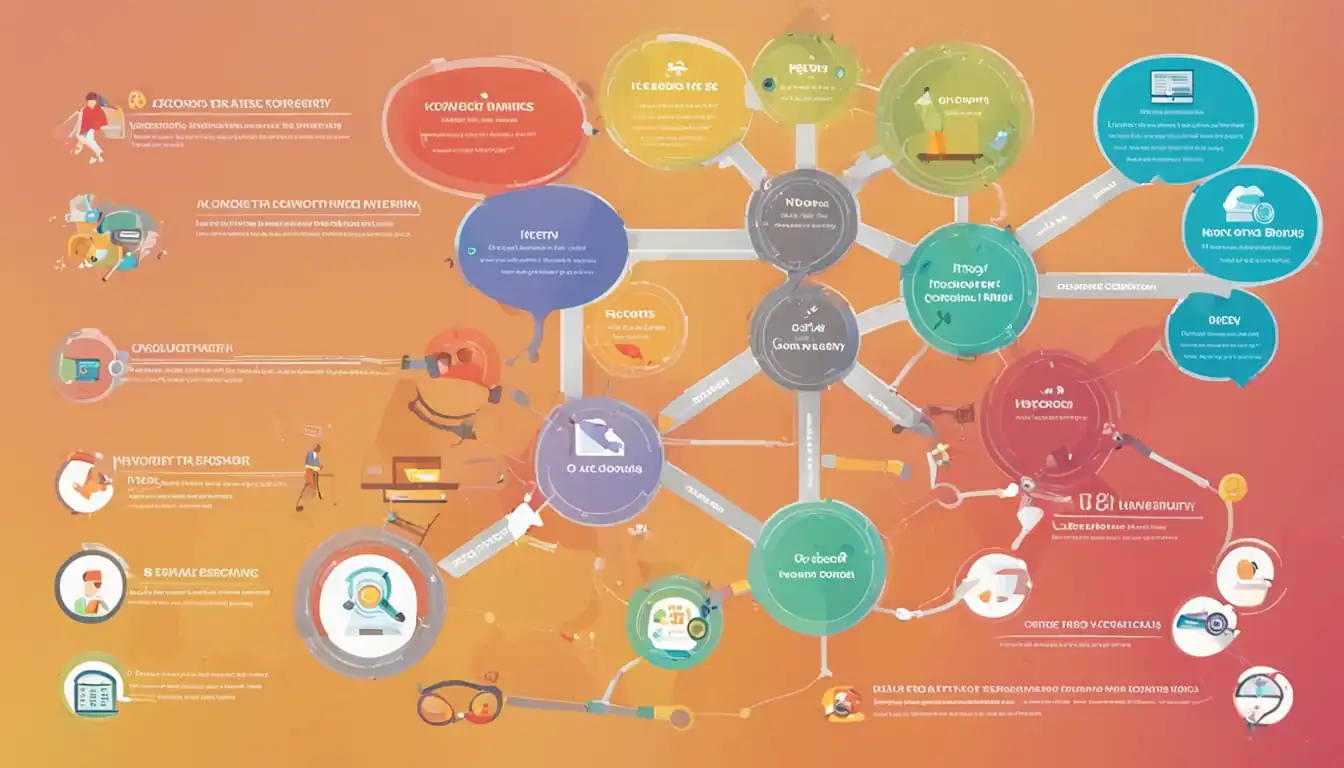Mastering SEO Content Management

In the vast world of digital marketing, mastering SEO content management is like finding a needle in a haystack. But fear not, as we dive into the realm of understanding SEO content management, exploring key components of an effective strategy, delving into essential tools and technologies, uncovering best practices for optimization, and finally measuring success through key performance indicators and tracking tools. So buckle up and get ready to take your SEO game to the next level!
Understanding SEO Content Management

What is SEO Content Management
SEO content management refers to the process of creating, optimizing, and managing content on a website with the goal of improving its search engine rankings. It involves incorporating relevant keywords, creating high-quality content, and ensuring that the website is user-friendly and easily navigable for both users and search engines.
The Role of Content in SEO
Content plays a crucial role in SEO as search engines like Google prioritize websites that offer valuable and relevant content to users. High-quality content not only attracts visitors to your site but also helps improve your search engine rankings. By creating informative, engaging, and optimized content, you can increase your website's visibility online and drive organic traffic to your site.
"Content is king in the world of SEO. Without quality content, it's nearly impossible to achieve sustainable success in search engine rankings."
Key Components of Effective SEO Content Strategy

Crafting Quality Content
Crafting quality content is the cornerstone of any successful SEO strategy. High-quality, relevant, and engaging content not only attracts readers but also helps search engines understand the relevance of your website to users' queries. When creating content, focus on providing value to your audience by addressing their needs and answering their questions.
Key Points:
- Ensure your content is well-written, informative, and easy to read.
- Use relevant keywords naturally throughout your content.
- Include multimedia elements such as images, videos, and infographics to enhance user experience.
Importance of Keyword Research
Keyword research plays a crucial role in optimizing your content for search engines. By identifying the right keywords that are relevant to your target audience and have high search volume, you can improve your chances of ranking higher in search engine results pages (SERPs). Conduct thorough keyword research to understand what terms people are using to find information related to your industry or niche.
Key Points:
- Use tools like Google Keyword Planner, SEMrush, or Ahrefs to identify relevant keywords.
- Focus on long-tail keywords that are specific and less competitive.
- Incorporate keywords strategically in your content, including titles, headings, meta descriptions, and body text.
Remember, mastering SEO content management requires a combination of high-quality writing skills and strategic keyword optimization techniques. By focusing on crafting quality content and conducting thorough keyword research, you can enhance the visibility of your website in search engine results and attract more organic traffic.
Tools and Technologies for SEO Content Management
In the world of SEO content management, having the right tools and technologies at your disposal can make all the difference in the success of your strategy. Here are some essential software solutions and tips for leveraging AI in content creation.
Essential Software Solutions
When it comes to managing SEO content effectively, there are several software solutions that can help streamline your processes and improve your results. Some essential tools to consider include:
Content Management Systems (CMS): Platforms like WordPress, Drupal, or Joomla make it easy to create and manage SEO-friendly content on your website.
Keyword Research Tools: Utilize tools like SEMrush, Ahrefs, or Google Keyword Planner to identify relevant keywords for your content.
SEO Analytics Platforms: Tools like Google Analytics or Moz Pro can provide valuable insights into the performance of your SEO content.
Content Calendar Tools: Use platforms like CoSchedule or Trello to plan and organize your content schedule effectively.
SEO Plugins: Consider using plugins like Yoast SEO for WordPress to optimize your content for search engines.
By utilizing these software solutions, you can streamline your SEO content management process and improve the effectiveness of your strategy.
Leveraging AI in Content Creation
Artificial Intelligence (AI) has revolutionized many industries, including content creation. By leveraging AI tools in your SEO content management strategy, you can enhance efficiency and produce higher quality content. Some ways to incorporate AI into your content creation process include:
Automated Content Generation: Tools like GPT-3 or Jarvis can help generate written content quickly based on specific prompts.
Content Optimization: AI-powered tools can analyze data and suggest improvements to optimize your content for search engines.
Personalization: Use AI algorithms to personalize content based on user behavior and preferences.
Natural Language Processing (NLP): NLP technology can help improve the readability and relevance of your content for better SEO performance.
By incorporating AI into your SEO content management strategy, you can stay ahead of the competition and achieve better results in driving organic traffic to your website.
Best Practices in SEO Content Optimization
In the realm of SEO content management, mastering optimization techniques is crucial for achieving high search engine rankings and driving organic traffic to your website. Here are some best practices to consider:
On-Page Optimization Techniques
On-page optimization involves optimizing individual web pages to rank higher and earn more relevant traffic in search engines. Here are some key on-page optimization techniques to master:
- Keyword Research: Conduct thorough keyword research to identify relevant keywords that your target audience is searching for.
- Meta Tags: Optimize meta titles and descriptions with targeted keywords to improve click-through rates.
- Quality Content: Create high-quality, engaging content that provides value to readers and incorporates targeted keywords naturally.
- Internal Linking: Use internal linking to connect related content within your website and improve site structure.
- Optimized Images: Optimize images with descriptive alt text and file names to improve accessibility and SEO.
Off-Page Strategies to Enhance Visibility
Off-page strategies play a significant role in enhancing visibility and authority for your website. Here are some off-page strategies to consider mastering:
- Link Building: Build high-quality backlinks from authoritative websites to improve your site's credibility and ranking.
- Social Media Presence: Establish a strong presence on social media platforms to increase brand awareness and drive traffic back to your website.
- Guest Blogging: Contribute guest posts on reputable websites within your industry to build relationships, gain exposure, and earn backlinks.
- Online Reviews: Encourage satisfied customers to leave positive reviews on review sites like Google My Business or Yelp to boost credibility.
By implementing these best practices in SEO content optimization, you can effectively manage your content strategy and drive sustainable results for your website's visibility and organic traffic growth.
Measuring the Success of Your SEO Content Strategy

In order to effectively manage your SEO content, it is crucial to measure the success of your strategy. This allows you to track progress, identify areas for improvement, and make data-driven decisions moving forward.
Key Performance Indicators (KPIs)
Key Performance Indicators (KPIs) are essential metrics that help you gauge the effectiveness of your SEO content strategy. By monitoring these KPIs regularly, you can assess the impact of your efforts and adjust your approach as needed. Some common KPIs to consider include:
- Organic traffic: The number of visitors coming to your website through organic search results.
- Keyword rankings: The positions of your target keywords in search engine results pages.
- Click-through rate (CTR): The percentage of users who click on your website link after seeing it in search results.
- Bounce rate: The percentage of visitors who leave your website after viewing only one page.
- Conversion rate: The percentage of visitors who take a desired action on your website, such as making a purchase or filling out a form.
By tracking these KPIs and setting specific goals for each, you can measure the effectiveness of your SEO content strategy and make informed decisions based on real data.
Tools for Tracking and Analysis
There are various tools available to help you track and analyze the performance of your SEO content. These tools provide valuable insights into key metrics, keyword rankings, competitor analysis, and more. Some popular tools for tracking and analysis include:
- Google Analytics: A free tool that provides detailed insights into website traffic, user behavior, and conversion rates.
- SEMrush: A comprehensive platform for keyword research, competitor analysis, backlink audits, and more.
- Moz Pro: An all-in-one SEO toolset that offers features such as keyword research, site audits, rank tracking, and link building opportunities.
- Ahrefs: A powerful tool for backlink analysis, keyword research, competitor analysis, and site audits.
By utilizing these tools effectively, you can gain valuable insights into the performance of your SEO content strategy and make data-driven decisions to improve results over time.
Conclusion
With these insights into mastering SEO content management, you are now equipped with the knowledge and tools needed to navigate the ever-changing landscape of digital marketing. Remember, crafting quality content, conducting thorough keyword research, utilizing essential software solutions, implementing on-page optimization techniques, leveraging off-page strategies for visibility enhancement, and tracking success through key performance indicators are all crucial elements in creating a successful SEO content strategy. So go forth and conquer the world of search engine optimization with confidence!